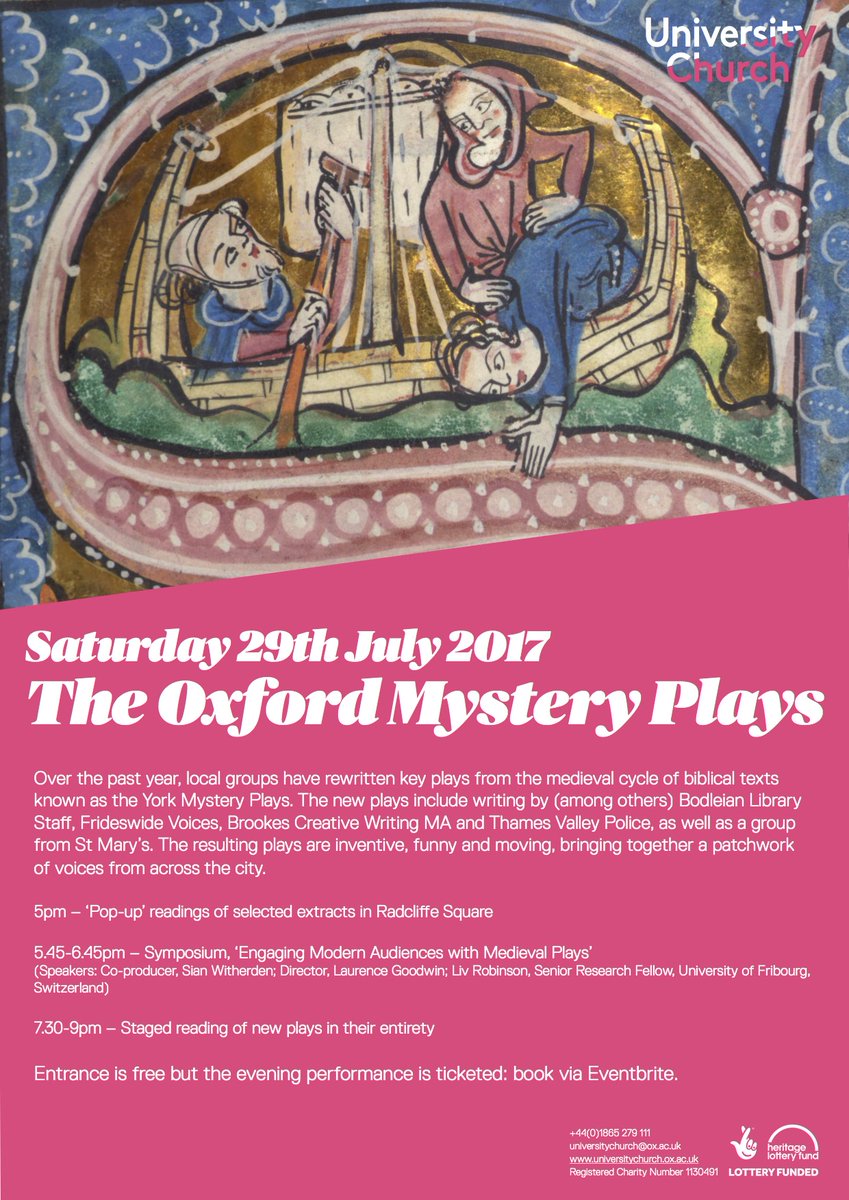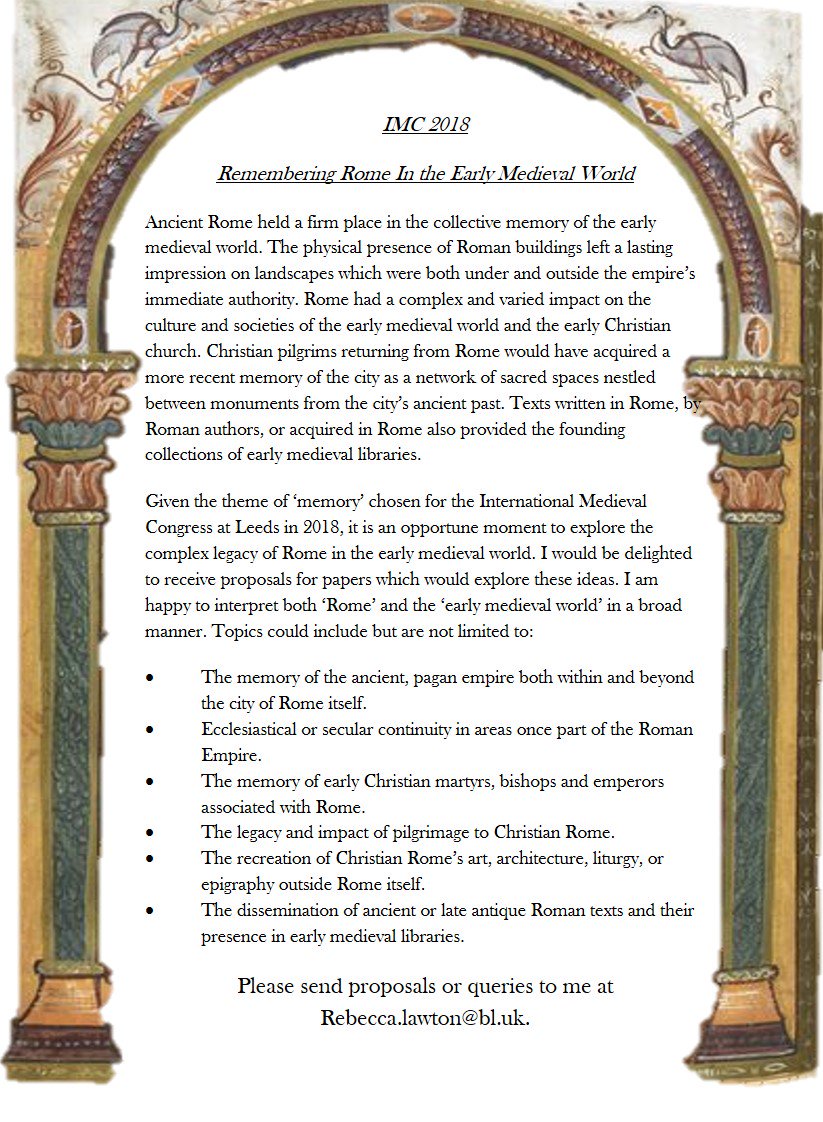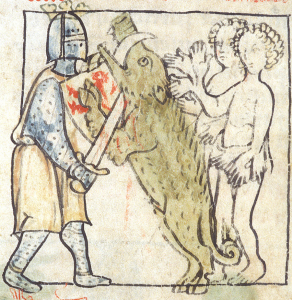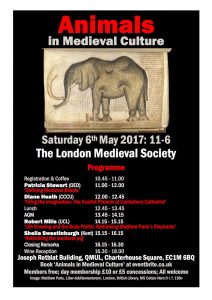To book tickets, visit http://www.universitychurch.ox.ac.uk/mystery-plays/
Author Archives: admin
CFP: IMC 2018 – Remembering Rome in the Early Medieval World
Conference: England in Europe (Thirteenth Century England XVII) Selwyn College, Cambridge (4th-6th September)
The Thirteenth Century England Conference, which brings together scholars on all areas of English (and latterly British) history, has been running every two years for thirty years. In 2015 the Conference moved from Aberystwyth to Cambridge, and we are based here again for the XVIIth edition in September 2017. TCE represents the largest forum devoted specifically to work on the Long Thirteenth Century and has over the years served to introduce many new scholars and new scholarship to those working on the period.
The theme in 2017 is ‘England in Europe’.
The aim is to explore the complex and multifaceted, not to mention highly topical, relationship between the British Isles and their continental contexts. The conference will be an opportunity to reflect on the extent to which recent scholarship on England and its British neighbours in the long thirteenth century has been shaped up by considerations of Britain’s place in Europe but also by wider trends in the history of medieval Europe. The focus of the conference remains very much on fostering collaborative scholarship, introducing and encouraging emerging historians of the period, and hearing about new research.
The venue is Selwyn College, and residential accommodation is on offer to delegates who wish to stay in Cambridge across the three days. The conference organizers are Julie Barrau, Chris Briggs, Caroline Burt, Andrew Spencer and Carl Watkins If you have an enquiry about the conference, please contact Julie Barrau (jb534@cam.ac.uk).
CFP: The Animal in Medieval Romance (15/09/17)
The ‘animal turn’ is one of the newest and most exciting developments in medieval scholarship. Researchers are increasingly interrogating the role of animals in society and culture, the interaction between human and beast, and the formation of human and non-human identities. The Medieval Romance Society is hosting two sessions on the role of animals in romances at the 53rd International Congress on Medieval Studies 2018, Western Michigan University, Kalamazoo. We welcome papers which draw on a broad range of methodologies and themes.
Session I: The Animal in Medieval Romance I: The Animal as Friend
This session invites papers examining the co-dependent relationships between animals and humans in romances. We encourage a broad interpretation of this theme, including cross-species friendships, sexual and romantic couplings, domestication and farmyard animals, and animals as parental surrogates.
Session II: The Animal in Medieval Romance II: The Animal as Product
This session welcomes papers which examine how animal bodies are exploited in medieval romances. Even after death, animals continue to exert their presence in romance narrative through their earthly remains. The genre’s commodification of bestial bodies also extends beyond texts to the physical product of vellum upon which they are transmitted. Papers might explore themes of butchery, the wearing of skins and furs, the use of bone and ivory, and the production of parchment and manuscript-binding.
Please send abstracts of 250-300 words to Tim Wingard at tw659@york.ac.uk by 15th
September 2017. For more info, visit: medievalromanceanimal.wordpress.com
Conference: Chronic Pain in the Middle Ages (29/9/17)
‘Why is my pain perpetual?’ (Jer 15:18): Chronic Pain in the Middle Ages
Start: Sep 29, 2017 09:00 AM
End: Sep 29, 2017 07:00 PM
Location: IAS Common Ground, Ground Floor, South Wing, Wilkins Building, UCL
Pain is a universal human experience. We have all hurt at some point, felt that inescapable sensory challenge to our physical equanimity, our health and well-being compromised. Typically, our agonies are fleeting. For some, however, suffering becomes an artefact of everyday living: our pain becomes ‘chronic’. Chronic pain is persistent, usually lasting for three months or more, does not respond well to analgesia, and does not improve after the usual healing period of any injury.
Following Elaine Scarry’s (1985) seminal work The Body in Pain, researchers from various humanities disciplines have productively studied pain as a physical phenomenon with wide-ranging emotional and socio-cultural effects. Medievalists have also analysed acute pain, elucidating a specifically medieval construction of physical distress. In almost all such scholarship – modern and medieval – chronic pain has been overlooked.
The new field of medieval disability studies has also neglected chronic pain as a primary object of study. Instead, disability scholars in the main focus on ‘visible’ and ‘mainstream’ disabilities, such as blindness, paralysis, and birth defects. Indeed, disability historian Beth Linker argued in 2013 that ‘[m]ore historical attention should be paid to the unhealthy disabled’, including those in chronic pain (‘On the Borderland’, 526). This conference seeks specifically to pay ‘historical attention’ to chronic pain in the medieval era. It brings together researchers from across disciplines working on chronic pain, functioning as a collaborative space for medievalists to enter into much-needed conversations on this highly overlooked area of scholarship.
Relevant topics for this conference include:
-Medieval conceptions and theories of chronic pain, as witnessed by scientific, medical, and theological works
-Paradigms of chronic pain developed in modern scholarship – and what medievalists can learn from, and contribute to, them -Comparative analyses of chronic pain in religious versus secular narratives -Recognition or rejection of chronic pain as an affirmative subjective identity -Chronic pain and/as disability -The potential share-ability of pain in medieval narratives, such as texts which show an individual taking on the pain of another -The relationship between affect and the severity, understanding, and experience of pain -The manner in which gender impacts the experience, expression, and management of an individual’s chronic pain
Keynote address:
-Prof Esther Cohen (Hebrew University of Jerusalem), one of the foremost scholars on pain in the Middle Ages, will deliver the keynote address: ‘What is Chronic Pain in a Non-Neural Age? Working Definitions, Sources, and Methodologies’.
Confirmed speakers:
-Dr Katherine Harvey (Birkbeck, University of London, UK), ‘Chronic Pain and the Saintly Bishop in Medieval England’
-Dr James McKinstry (Durham University, UK), ‘Headaches, Diseases, and Old Age: William Dunbar’s Diagnosis of Chronic Pain’
-Dr Michele Moatt (National Trust and Lancaster University, UK), ‘Chronic Pain and Prophecy in the Twelfth-century Life of Aelred of Rievaulx’
-Catherine Coffey (Queen’s University, Belfast, Northern Ireland), ‘“Mit zwoelf tugenden stritet si wider das vleisch”: The Body Fighting the Flesh in Mechthild von Magdeburg’s Das fließende Licht der Gottheit’
-Katherine Briant (Fordham University, New York, USA), ‘Pain as a Theological Framework in Julian of Norwich’s Vision and Revelation’
-Dr Nicole Nyffenegger (Bern University, Switzerland), ‘Mary’s Perpetual Physical Pain: Affective Piety and “Doubling”’
-Prof Wendy J Turner (Augusta University, Georgia, USA), ‘Mental Complications of Pain: Age and Violence in Medieval England’
-Dr Bianca Frohne (University of Bremen, Germany), ‘Living With Pain: Constructions of a Corporeal Experience in Early and High Medieval Miracle Accounts’
-Dr William Maclehose (University College London, UK), ‘A Locus for Healing: Saints’ Shrines and Representations of Chronic Pain’
For more information, visit http://www.ucl.ac.uk/institute-of-advanced-studies/ias-events/why_is_my_pain_perpetual_chronic_pain_in_the_middle_ages
Personification and Alienation: The Case of Deguileville (30/5/17, Old Combination Room, Trinity College, 5.15)
Professor Nicky Zeeman will give a paper entitled ‘Personification and Alienation: The Case of Deguileville’ as part of the Poetics Before Modernity seminar series, on Tuesday 30th May at 5.15 in the Old Combination Room, Trinity College. An abstract for the paper, and a biography of the speaker, are below.
Personification and Alienation: the Case of Deguileville
I shall be looking at the rhetorical and poetic figure of personification (known variously as metonymy, prosopopoeia or conformatio) with a view to asking if the way that writers form their personifications can tell us anything about how they understand the subject. One starting point is Angus Fletcher’s observation that the personification could be seen not just in the Stoic manner as daimonic but as a kind of maniac or obsessive. Personification yokes together a number of elements that are in tension with each other: if on the one hand it invokes the idea of the ‘person’, along with its implications about the possibility of inner life and a capacity to speak, act or change, personification also involves a delimiting characteristic, category or bias that constrains the person, something that is true whether the personification represents a particular term, concept or ‘thing’, or whether it represents a particular historical, mythical or fictional character. My hunch is that because the ‘person’ in personification is in some way partial, driven or over-determined, and as a result potentially at odds with itself or its surroundings, it may also be for medieval writers a way of thinking about how the subject might also have these features. The tensions and contradictions that are fundamental to the figure of personification, in other words, mean that writers can use it to think about about the difficulties of being a subject, all the while evading the connotations of coherent personhood that are, potentially at least, to be found in more mimetic narrative modes. My test case will be the personifications of Guillaume de Deguileville’s fourteenth-century French Pelerinage de vie humaine, with their dislocated voices, grotesque bodies and insecure relation to the embodied world: I shall be arguing that they model an alienated subjectivity that can also be seen across the text as a whole – and one that may not only be premodern.
Nicolette Zeeman
(King’s College and University of Cambridge)
Nicolette Zeeman is Professor of Medieval and Renaissance English in the Faculty of English at King’s College and the University of Cambridge. Author of Piers Plowman and the Medieval Discourse of Desire (Cambridge University Press, 2006), she contributed to and co-edited with Jean Michel Massing King’s College Chapel 1515-2015. Art, Music and Religion in Cambridge (Harvey Miller, 2014), and with Dallas Denery II and Kantik Ghosh Uncertain Knowledge. Scepticism, Relativism, and Doubt in the Middle Ages (Brepols, 2014). She has also published other essays on Piers Plowman, Chaucer, medieval literary theory, song, psychology and allegory. Her next monograph will be Arts of Disruption. Conflict and Contradiction in Medieval Allegory and Piers Plowman, and she is developing a project on ideas about idolatry in later medieval culture, provisionally entitled Caught in the Body.
Conference: Early Modern Dance, Politics and Pleasure (12/5/17)
The CEMS Dance Workshop, Early Modern Dance: Politics and Pleasure, combines four academic papers and an interactive dance workshop led by Baroque dance specialist Philippa Waite. The event is aimed at specialists and non-specialists alike, of both early modernity and practical dance. The papers will explore the wide variety of early modern dance, from its courtly incarnations to their subversions, in its popular and colonial political contexts, and as civilising force and liberating expression. The dance workshop will last for an hour and a half and focus on teaching court dance of the Baroque period.
For (free) tickets, visit https://www.eventbrite.co.uk/e/early-modern-dance-politics-and-pleasure-tickets-33887209556.
Conference: Animals in Medieval Culture (6/5/17)
CFP: Gender, Identity, Iconography (4/9/17)
A Gender and Medieval Studies Group and Society for Medieval Feminist Scholarship joint conference.
Corpus Christi College, University of Oxford
8th-10th January 2018
The glittering beauty of the Alfred Jewel, the rich illustration of the Lindisfarne Gospels, the dominating Great West Window of York Minster, the intricate embroidery of the Bayeux Tapestry, the luminous Maestà of Duccio, the opulent Oseberg ship burial, and the sophisticated imagery of the Ruthwell cross are all testament to the centrality of the visual to our understanding of a range of medieval cultures.
Constructed at and across the intersections of race, disability, sexual orientation, religion, national identity, age, social class, and economic status, gendered medieval identities are multiple, mobile, and multivalent. Iconography – both religious and secular – plays a key role in the representation of such multifaceted identities. But visual symbols do not merely represent personhood. Across the range of medieval media, visual symbolism is used actively to produce, inscribe, and express the gendered identities of both individuals and groups.
The 2018 Gender and Medieval Studies Conference welcomes papers on all aspects of gender, identity and iconography from those working on medieval subjects in any discipline.
Papers may address, but are not limited to:
Sight and Blindness
Visible and Invisible Identities
Visual Languages
Colour and Shade
Icons and Iconoclasm
Light and Darkness
Collective and Individual Identities
Orthodox and Heretical imagery
Aesthetics
Subject and Motif
Convention and Innovation
We invite proposals for 20-minute papers. Please email proposals of approx. 200 words to gmsconference2018@gmail.com by Monday 4 September 2017. We will also consider proposals for alternative kinds of presentation, including full panel proposals, performance and art; please contact the organisers to discuss.
A conference for everyone
Corpus Christi College’s auditorium is fully wheelchair accessible, has accessible toilets, and features a hearing loop for those using hearing aids. Please contact us if you have specific accessibility needs you would like to discuss. We plan to provide a private lactation space.
It is hoped that the Kate Westoby Fund will be able to offer a modest contribution towards (but not the full costs of) as many postgraduate student travel expenses as possible. We are exploring other avenues to make the conference financially feasible for postgraduates and early career scholars to attend.



